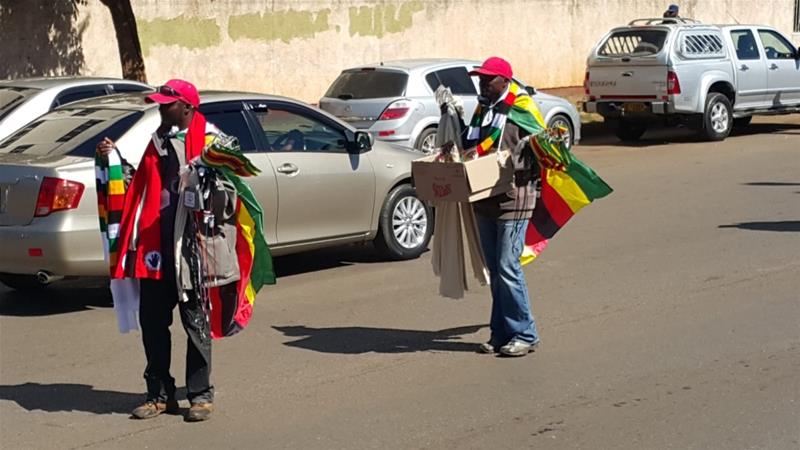Zimbabwe: campaign period good for business
July 25, 2018 | Expert Insights

General elections in Zimbabwe are scheduled to be held on 30th July 2018 to elect the President and members of both houses of Parliament. The campaign period has been a welcome relief for some business owners but experts warn that good times will not last.
Background
For multiple decades now Zimbabwe has struggled to feed its own people due to severe droughts and the effects of a land reform programme which saw the seizure of white-owned farms redistributed to landless black Zimbabweans which led to sharp falls in production.
In November 2017, the nation has been gripped in political crisis. Former Vice President of Zimbabwe, Emmerson Mnangagwa, alleged that President Robert Mugabe, had threatened his life. Mnangagwa, who was sacked by the President in November 2017, then fled to South Africa.
Shortly after the Vice President left the nation, the country’s army commander Constantino Chiwenga said on that the military would act if purges against former war liberation fighters did not cease. In addition, soldiers took over the headquarters of the state broadcaster ZBC and blocked access to government offices. However, the army insisted that this wasn’t a coup to replace Mugabe from power.
After being in power for 37 years, Robert Mugabe resigned as the President of Zimbabwe with immediate effect in November 2017. For nearly eight days, he had resisted growing calls for resignation. Even party leaders had begun calling on him to step down to deescalate the situation.
On 10th July, Zimbabwe launched its space agency to enhance the use of space technology for sustainable development. Analysts feel that strategically investing in Space technology has given President Mnangagwa a head start in the presidential elections.
Analysis
The election campaign for the 30th July general elections in Zimbabwe has been a ray of hope for it’s farmers as well as the distressed economy.The main contestants for the post of the President are ZANU-PF leader President Mnangagwa and the MDC party led by Nelson Chamisa.
However, the elections are not behind on sparking violence and resorting to mudslinging. Zimbabwean President Mnangagwa on Tuesday said that if the country’s main opposition MDC Alliance presidential candidate Nelson Chamisa chooses chaos, the law would prevail. Home Affairs Minister Obert Mpofu said that the government had raised the security alert in the country in the wake of threats by the Chamisa-led opposition to picket at the elections management body offices.
Last week,President Mnangagwa told a crowd of white voters that their land wouldn’t be taken away and called on them to work with the government, during a campaign rally nine days before elections.Mnangagwa’s appeal to white voters, many of them farmers, marked a sharp departure from his predecessor Robert Mugabe, who launched an often violent “land reform” campaign to seize farmland from white owners and give it to blacks and devastated the agricultural sector.
The hotel industry in Zimbabwe has seen a surge in customers amid a growing international interest in the landmark election following last year's resignation of decades-long President Robert Mugabe in the wake of a military intervention.Similarly, newspapers and radio stations’ advertising revenue has shot up as candidates compete to get their message out to voters.
The car rental industry is also among the beneficiaries of the election campaigns. At Impala Car rental, one of the largest car hire companies in the country, demand is so high they have run out of vehicles to rent."Comparing business to the past two months, we have seen a rise in our figures, so we know it is from the election season and we hope it will continue like this,"said Tracy Ngoma, a manager at the company.
In 2009, the landlocked southern African country abandoned its currency amid sky-high inflation. The US dollar is currently the main currency for doing business in the country where a cash shortage is strangling the already hard-pressed businesses.Last year,Zimbabwe's Reserve Bank introduced "bond notes" to deal with the dollar shortage. But instead of improving the situation, the notes helped increase the demand for dollars.
However, the 2018 election campaigning by candidates has help improve the currency situation in Zimbabwe. "The dollar-to-bond rate is better now thanks to the politicians spending money," said Nelo Kamukore, a black market money exchanger."The bond is worth more now which means people can buy more with their bonds. I hope it stays the same after the election is over" he added.
Counterpoint
"The election has been a time for some businesses to make money - there's lots of money being spent on campaigning and on consumption," says economist Vince Musewe.He was quick to add, however, that the current trickle of cash into the economy is not a long-term fix for Zimbabwe's financial woes.
Assessment
Our assessment is that the money circulating in the Zimbabwe economy due to election campaigning is merely a short-term surge in its economy. We feel that this situation will not sustain beyond the elections. We believe that the most significant task the new president will have to take on will be to deal with the liquidity crisis in Zimbabwe.








Comments